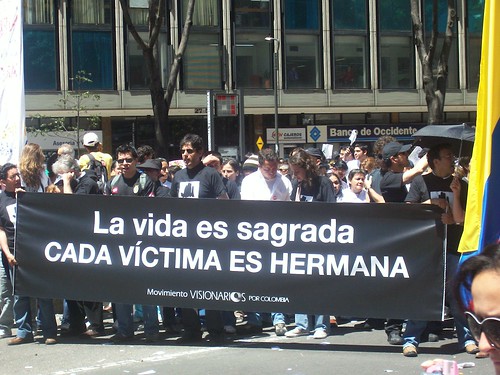
On Friday four hostages held against their will by Colombia’s FARC rebels for over ten years were gunned down during a failed rescue attempt. Over the past few days, members Colombians blasted the guerillas for their cruel and senseless actions, while families of the victims grieve and lament their loss.
Numerous public figures from around the world also expressed their condemnation of the massacre by the FARC. Pope Benedict XVI said that he was in “pain” over the deaths of the hostages and urged for an end to violence in Colombia. "The Holy Father received this tragic news with sorrow and sends his prayers to the families of the victims and the beloved people of Colombia at this time of suffering," read a letter from the Pontiff.
Organization for American States chief José Miguel Insulza claimed that the deaths were a “crime against humanity” and a serious violation of “international humanitarian rights.” Insulza also called for the immediate release of all prisoners held by the FARC and said that freeing them is a “necessary precondition for peace (talks).”
The United Nations human rights representative in Colombia, Christian Salazar, said that “the
atrocious assassinations reflect a terrible lack of humanity and complete disrespect for life.”
José Miguel Vivanco, Americas director at Human Rights Watch, labeled the deaths as a “war crime,” while a statement from the U.S. embassy in Colombia deemed the incident as a “terrorist act.”
Catherine Ashton, the head of the European Union’s diplomatic division, said on Tuesday that the FARC should “lay down their arms” and join the “process of political reform and modernization in Colombia.” That doesn’t seem like it will be the case according to Andrés Mejía Vergnaud in the Americas Quarterly blog:
Peace with a group that commits such acts will be hard to swallow in Colombia and abroad, especially if, as FARC leaders have made it clear, they will not accept convictions or prison terms. Growing international demands for the prosecution of crimes against humanity and war crimes make blanket pardons impossible; something that Colombians would hardly accept, in any case.A police sergeant held by the FARC for nearly twelve years narrowly escaped being executed by the rebels on Friday. “I felt the impact on my face and neck, the shots were at me, the only thing I could do was run,” said Luis Erazo to the local press over the weekend.
Image Source – Flickr user equinoXio (“Every life is sacred” reads this banner at a 2008 anti-FARC protest in Medellin, Colombia). (CC BY 2.0)
Online Sources – AFP, Colombia Reports, Noticias Caracol, Radio Santa Fe, EFE, Human Rights Watch, Voz de America, Reuters, Americas Quarterly blog
No comments:
Post a Comment